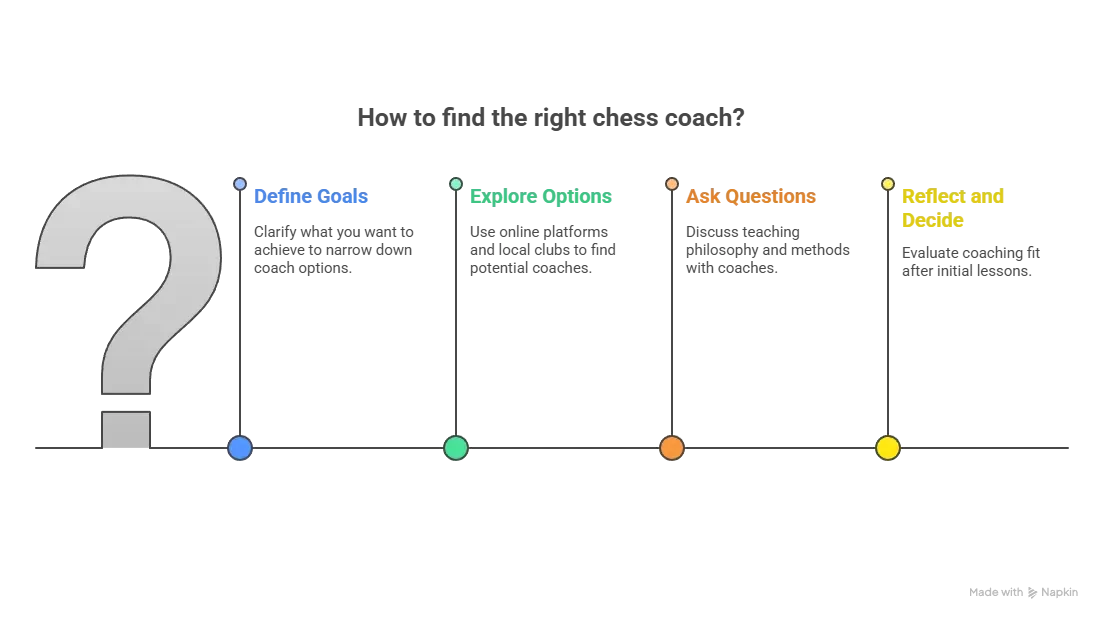Introduction
Finding the right chess coach can be a game-changer in your improvement journey. If you are wondering how to find a chess coach who fits your goals, skill level, and learning style, you’re already taking the first step toward faster progress.
Whether you’re just starting out and trying to grasp the fundamentals or you’re an advanced player working to overcome stubborn plateaus, a good coach can help you progress faster and more effectively than self-study alone. Coaches provide structure, personalized feedback, accountability, and insights that are hard to gain from books or videos alone.
This guide is for players of all levels – beginners who want to build a strong foundation, intermediate players looking to refine their strategies, and advanced competitors aiming to push beyond their current rating ceilings.
In this article, you’ll learn whether getting a chess coach is worth it, how much it typically costs, the key factors to consider when choosing one, and how to find a chess coach who’s the right fit for your goals and learning style.

Is Getting a Chess Coach Worth It?
Is getting a chess coach worth it? For most players, the answer is a resounding yes. While books, videos, and online puzzles can take you far, a coach provides something they can’t – personalized guidance,
A good chess coach quickly identifies your strengths, spots recurring weaknesses, and designs a study plan tailored specifically to you. They hold you accountable, help you avoid wasting time on inefficient study methods, and give you insider insights that accelerate progress.
If your goal is steady improvement and breaking through plateaus, investing in a coach is one of the most effective decisions you can make for your chess growth.
How Much Does a Chess Coach Cost?
The cost of a chess coach varies depending on experience, location, and lesson type.
Online lessons often range from $15 to $100 per hour, while in-person coaching can be higher.
Many players try to find the cheapest option, but price per hour isn’t always the best measure.
Think instead about value: a more experienced coach may cost more per hour but help you improve much faster.Look at the cost per improvement, not just the hourly rate, when choosing a coach.
Where to Find a Chess Coach
Online Coaching Platforms
Finding a chess coach online is easy. Many websites offer coaching services and directories of qualified instructors. Reviews and ratings help you choose the right coach. For personalized online coaching, contact us today to schedule a lesson and start improving your chess.
Local Chess Clubs and Communities
If you like in-person learning, local chess clubs are a great option. Many clubs list certified coaches or can recommend instructors. Schools, community centers, and scholastic leagues may also have chess teachers. In-person coaching is great for hands-on instruction and playing in local events.
How to Find the Right Chess Coach
Key Qualities to Look For
- Professionalism and sincere investment in your progress: A great coach genuinely cares about helping you improve, not just about taking your money.
- Proven experience and teaching success: Look for coaches with a solid track record, whether through tournament achievements or demonstrated student progress. You can also review testimonials from their students to see real examples of how their coaching has made a difference. For example, check out our student testimonials to hear directly from those who have improved through our coaching.
- Expertise in your current level and goals: Choose a coach who understands your skill level – whether you’re a beginner, intermediate, or advanced player – and who can tailor lessons accordingly.
- Personalized lesson plans and individual feedback: Avoid one-size-fits-all instruction. Your coach should customize lessons based on your strengths, weaknesses, and goals.
- Interactive and engaging instruction style: The best coaches keep lessons dynamic by combining explanations, practice games, puzzles, and analysis.
Communication and Compatibility
- Clear and timely responses: Effective communication outside of lessons is important for scheduling and clarifying doubts.
- Teaching style that matches your learning preferences: Some students prefer detailed explanations, others like hands-on practice – find a coach who suits your style.
- Willingness to adapt lessons to your needs: A good coach adjusts their approach based on your progress and feedback.
How to Find a Chess Coach: Step-by-Step
1. Define Your Goals
Before you start your search, clearly identify what you want to achieve. Are you aiming to boost your rating, master certain openings, or prepare for upcoming tournaments? Your goals will help narrow down coaches who specialize in those areas.
2. Explore and Compare Options
Use trusted online platforms like Chess.com and Lichess to find qualified online coaches. Additionally, explore dedicated coaching websites for structured programs. For those interested in in-person learning, reach out to your local chess clubs or national federations for recommendations.
3. Reach Out and Ask Questions
Contact potential coaches to discuss their teaching philosophy, lesson structure, and methods of tracking student progress. This will help you understand if their approach aligns with your expectations.
4. Reflect and Decide
After a few lessons or conversations, evaluate how well the coaching matches your learning needs and goals. Choose the coach who best supports your development and with whom you feel motivated to continue.

Conclusion
Finding the right chess coach can be a game-changer in your chess journey, whether you’re just starting out or aiming to reach higher competitive levels. By knowing where to look, what qualities to prioritize, and how to approach your search, you set yourself up for meaningful improvement and a more enjoyable learning experience.
Remember, the best coach for you is one who understands your goals, communicates clearly, and provides personalized, engaging instruction that keeps you motivated. If you’re ready to take your chess to the next level, don’t hesitate to reach out to us – we’re here to help you grow and succeed every step of the way.
Feel free to contact us with any questions or to start your coaching journey today!
Frequently Asked Questions
1. How often should I have chess coaching sessions to see improvement?
Consistency matters more than frequency. For most players, one to two sessions per week combined with regular practice is ideal to steadily improve.
2. What’s the difference between online and in-person chess coaching?
Online coaching offers flexibility and access to a wider range of coaches, while in-person lessons provide direct interaction and often more immediate feedback during practice games.
3. How do I know if a chess coach is qualified?
Look for coaches with proven playing experience, positive testimonials, and a teaching style that matches your needs. Credentials and student success stories are good indicators.
4. Can a beginner benefit from hiring a chess coach?
Absolutely! A good coach can help beginners build strong fundamentals, avoid common mistakes, and develop a love for the game early on.
5. What should I prepare before my first chess coaching session?
Be ready to share your current level, goals, and any specific areas you want to improve. Having a few recent games you struggled with can help your coach tailor the lessons.
